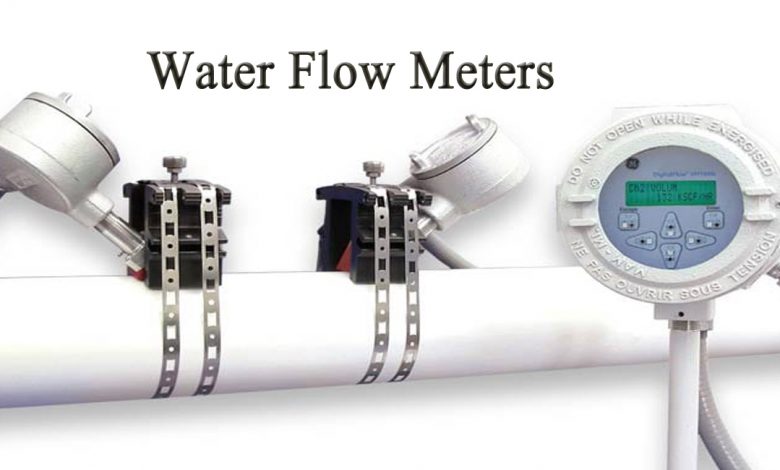Advantages and Disadvantages of Water Flow Meters

Water flow meters are instruments you can use to measure the quantity of water moving through a pipe or channel. You are always free to choose the best water flow meter depending on your budget, type of application, or the maintenance cost of the instrument.
There are many different water flow meter types that you can choose from. This article will help you know the specific types, their advantages, and their disadvantages. The main water flow meter types include; ultrasonic flow meters, mechanical water flow meters, magnetic flow meters, and vortex volumetric flow meters.
1. Ultrasonic flowmeters
An ultrasonic flowmeter is a type of water flowmeter that measures the speed of fluid or water. It uses ultrasound to estimate the fluid flow. It has some of its advantages and disadvantages which can either make you choose them for your measurement or not.
Advantages of ultrasonic flowmeters
i) No moving parts
Ultrasonic flow meters do not have any shifting parts. Therefore, it helps you not to worry about any blockage or frequent maintenance.
ii) Highly accurate
Ultrasonic flow meters provide the most accurate results of flow measurement. What you need to do is to install the meter and set it appropriately correctly. Examples of ultrasonic flow meters are inline, insertion, and clamp-on ultrasonic flow meters. Inline and insertion are usually highly accurate than clamp-on flow meters.
iii) It has a low maintenance cost
Since ultrasonic flow meters have no moving parts, you don’t need to maintain them regularly. It is why I highly prefer them over other water flow meter types. Also, they have a longer battery life, making them stay for long before you replace them.
iv) There is an option for digital and analog
Ultrasonic flow meters are usually available in many output ranges. Meaning, their advancement in technology makes them suitable for generating ultrasonic transducers using the digital option. The transducers give out the measurement results in real-time.
Disadvantages of ultrasonic flowmeters
i) They are limited to only measuring specific substances. For this reason, you cannot use ultrasonic flow meters to measure the flow rate of slurries or dirty fluids. Also, you cannot measure various liquids which cannot move through ultrasonic energy.
ii) Ultrasonic flow meters cost high in terms of purchase. It is why you can have a problem buying them. You may also need to repair some of its parts which may also be too expensive. System operators may also charge high when they want to install these flow meters for you.
2. Mechanical water flow meters
It is one of the significant water flow meter types which uses an impeller during the setup. The impeller rotates when there is the movement of water through the pipe. You can estimate the reading by observing the rotation directly proportional to the fluid flow volume. Some of the advantages include;
Advantages
i) Mechanical flow meters are cheaper, especially if you are installing them for the first time.
ii) Mechanical flow meters are simple, reliable, and provide the most accurate results. For this reason, everyone can use them on their measurements.
iii) Mechanical water flow meter types do not need frequent maintenance costs.
Disadvantages
i) With mechanical flow meters, you can usually suffer from head loss.
ii) Mechanical meters have some parts which can experience damage if you don’t regularly test their accuracy.
iii) You may need to repair the meter more frequently due to its subjection to wear and tear. In addition, it may interfere with the accuracy level.
3. Magnetic flowmeters
We can also call them Electromagnetic flow meters. These meters measure the flow rate of water by applying Faraday’s law of magnets. Below are the advantages and disadvantages.
Advantages
i) Magnetic flowmeters have no pressure loss.
ii) You can use electromagnetic flowmeters in measuring dirty liquids and slurries.
iii)They have a more comprehensive range of measurement with a diameter between 2.5mm to 2.6mm.
Disadvantages
i) Magnetic flowmeters only measure the flow rate of conductive media.
ii) The process of installing these meters is quite complicated.
4. Vortex flowmeters
Advantages
i) You can use vortex flow meters to measure liquids, gases, and steam flow rate.
ii) They lack moving parts.
iii) The variation in temperature, pressure, and density cannot affect them.
Disadvantages
i) If you want to use vortex flow meters, you must have inlet and outlet sections.
ii)There is a specific number of Reynolds that you need for successful measurement.
Conclusion
Choosing the best water flow meter types will enable you to get the most accurate results. You will also be able to save if your meter does not require frequent maintenance. That is why it is usually advisable to understand each flow meter before you make your decision correctly. You can also consult skilled system operators to help you choose the best for your application.




![Photo of FREE Cash App Referral Code 2022: GGSNPTR [Highest Cash App Sign up Bonus]](https://premiumpost.co/wp-content/uploads/2022/06/Cash-App-Free-Money-code-390x220.jpg)